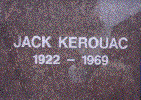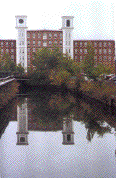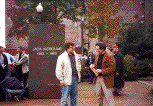saturday morning, reading howl
If everybody takes one page from Howl and you all read it aloud at the same time in front of the Kerouac commemorative at Bridge and French Streets, it sounds like a Buddhist chant. It feels like a prayer in the mouth. Vibrating. Urgent. Impassioned. Cacophonous.
If you look up from the commemorative you can see the outline of the old Keith's Theater in the red brick wall. In true New England fashion, you can see what "used to be".
If you listen, you can hear Allen Ginsberg reading by candlelight at the dedication of this monument to his good friend Jack. And you're glad somebody taped it. You're glad to be here now in the cold morning dampness among granite columns etched with prose and poetry.
If you drop a stone into the still water of the canal, you can see the ripples go out and out and out wrinkling the reflections of the warehouse, the mill, the fence, the pipes, the bridge ...outward and outward until you can't see it anymore but it's still rippling all the way to the Merrimack River and down river to Newburyport and out to sea.
|
Massachusetts Mills Reflected |
Tom talking to Paul Marion at the Kerouac Commemorative |
Paul's Pocket |
our desire to hold onto the moment
Brush Art Gallery. So many moments in color and black and white. Moments of Allen and friends. Moments of photographers. Moments of news. But a photograph is not really the moment. We can't retrieve the moments. No picture nor any recording nor any video lives in the flesh of our lives or anyone else's. Yet we hold onto the moment. As if the photos themselves are Allen Ginsberg or his friends instead of mere reminders.
Hey look, Tom, there you are in the candlelight with Allen in 1988. And here we are in the Brush Gallery in 1997 looking at your 1988 self lighting a candle for Jack as Allen's 1988 self reads.
Do we really have a separate self?

anne waldman at smith-baker
Ned has never looked so much like Victoria Woodhull as he does in the reflected footlights, leaning on the back of the bench in front of him conducting every word Anne Waldman speaks with his right hand, his face lined with 20th century life like a 19th century etching - his inner 19th century feminist cheering on her rant about the male energies that threaten our times...
Tom nods yes like he's saying Amen at some revival meeting. Poetry and prayer are indistinguishable to a Unitarian, I guess.
The boy sitting in front of me smells of Southern Comfort. The woman behind me smells of patchouli. I'm about to sneeze as Waldman's voice rises and falls like a drum beat. I can tap out the rhythm on the back of the bench. Her words weave in and out of my consciousness. My consciousness weaves in and out of the Smith-Baker center. Images catch me: warped Dylan records under the floor boards in Prague, the phone rings and Allen Ginsberg will never answer the phone again, what are you writing, Mom...
She finishes and the crowd wants to give her a standing ovation but we are slow to rise. We are nailed to our seats by her energy. It's nearly a minute before the audience rises to its feet applauding. Or maybe it only seemed like a minute.
We are reluctant to leave. Waldman's books are sold out by the time Tom, Ned, Patrick, and me make our way downstairs to the tables. Tom and Ned are bold and they speak with Waldman. I hang back shy. I notice that Patrick towers over everyone in the room. I joke: "You're the tallest poet here, Patrick". He answers: "I vote for Ned." Ned overhears this and tells him: "she meant height, not stature". We all laugh. The Dutch film crew is looking for Julie. She's off talking to somebody or other about sources for her new book on the beats. People keep assuming I am somebody because I'm with Julie. I laugh to myself.
Ned says he has to get Patrick home because he's 17. Patrick and I laugh. It's Ned who wants to get home. Patrick could outlast all of us with our middle aged and beyond bedtimes. Tom corrals Julie for the film crew. I slip out onto the street to my fabulous parking spot in front of the library and drive reluctantly home.


